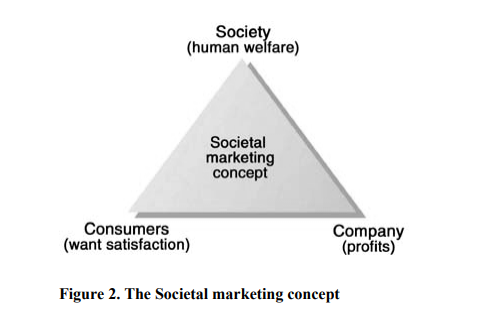There are major five alternative marketing management philosophies or often which are also known as alternative marketing orientations or concepts under which organizations conduct their marketing activities. These are
- The production concept
- The product concept
- The marketing- orientation/concept
- The societal marketing concept
The Production Concept
The production concept holds that consumers will favor products that are available and highly affordable. Therefore, management should focus on improving production and distribution efficiency. This concept is one of the oldest philosophies that guide sellers.
The production concept is still a useful philosophy in two types of situations. The first occurs when the demand for a product exceeds the supply. Here, management should look for ways to increase production. The second situation occurs when the product’s cost is too high and improved productivity is needed to bring it down.
The Product Concept
Another major concept guiding sellers, the product concept, holds that consumers will favor products that offer the most in quality, performance, and innovative features. Thus, an organization should devote energy to making continuous product improvements. The product concept can lead to marketing myopia.
The Selling Concept
Many organizations follow the selling concept, which holds that consumers will not buy enough of the organization’s products unless it undertakes a large-scale selling and promotion effort. The concept is typically practiced with unsought goods—those that buyers do not normally think of buying, such as encyclopedias or insurance. Most firms practice the selling concept when they have overcapacity. Their aim is to sell what they make rather than make what the market wants. Such marketing carries high risks. It focuses on creating sales transactions rather than on building long-term, profitable relationships with customers. It assumes that customers who are
coaxed into buying the product will like it. Or, if they don’t like it, they will possibly forget their disappointment and buy it again later. These are usually poor assumptions to make about buyers. Most studies show that dissatisfied customers do not buy again.
The Marketing Concept
The marketing concept holds that achieving organizational goals depends on determining the needs and wants of target markets and delivering the desired satisfactions more effectively and efficiently than competitors do. The selling concept and the marketing concept are sometimes confused. The selling concept takes an inside-out perspective. It starts with the factory, focuses on the company’s existing products, and calls for heavy selling and promotion to obtain profitable sales. It focuses primarily on customer conquest—getting short-term sales with little concern about who buys or why.
In contrast, many companies claim to practice the marketing concept but do not. They have the forms of marketing, such as a marketing vice president, product managers, marketing plans, and marketing research, but this does not mean that they are market-focused and customer-driven companies. The question is whether they are finely tuned to changing customer needs and competitor strategies. Implementing the marketing concept often means more than simply responding to customers’ stated desires and obvious needs. Customer-driven companies research current customers to learn about their desires, gather new product and service ideas, and test proposed product improvements. Such customer-driven marketing usually works well when a clear need exists and when customers know what they want.
The Societal Marketing Concept
The societal marketing concept holds that the organization should determine the needs, wants, and interests of target markets. It should then deliver superior value to customers in a way that maintains or improves the consumer’s and the society’s well being. The societal marketing concept is the latest of the five marketing management philosophies.
The societal marketing concept questions whether the pure marketing concept is adequate in an age of environmental problems, resource shortages, rapid population growth, worldwide economic problems, and neglected social services. It asks if the firm that senses, serves, and satisfies individual wants is always doing what’s best for consumers and society in the long run. Figure 2 summaries the societal marketing concept; it shows the need for linking and balancing the interests of society, the company and consumers.

